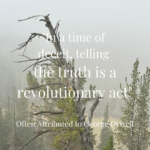“In a time of deceit, telling the truth is a revolutionary act”
Often Attributed to George Orwell
How it all Began
This series stems from a conversation with several friends—one of those exchanges that challenges thought and perspectives. The topic was truth in media, the pervasive mistrust of sources, especially mainstream media, and questioning how one sorts through the noise. We talked about the dangers of silos that are constructed around party views making it seem, at times, as though we’re not even talking about the same event.
When we discussed tools like Ground News, Snopes, and other fact-checking sites, we realized that even these are viewed as suspect by many, because someone or something (AI) is evaluating the factuality and bias. The problem of a common starting place for reasoned discourse seemed insurmountable. As I thought about our conversation, a key insight surfaced: one of the clearest barometers of inaccurate reporting is when the ‘author/speaker’ skews the interpretation of the events for the reader or tells the reader what to think—whether through direct assertions or through slanted, persuasive language.
While this series focuses on identifying bias through interpretation and persuasive language, it doesn’t address every facet of media literacy. For instance, opinion pieces, expert interviews, and editorial nuances are beyond its scope. Instead, the goal is to offer a practical framework for recognizing bias and fostering critical thinking, even when trust in external tools or platforms is limited. By examining familiar scenarios from multiple perspectives, we’ll explore how bias can subtly or overtly shape the truth we perceive. By examining a folk tale, a historical event, a current event, and a political event through three distinct lenses, we’ll explore how language and interpretation shape our perception of truth in the stories we consume.
Stone Soup: A Folk Tale
1. Factual Report: Traveler Introduces Stone Soup Tradition to Village
Today, a traveler visited a small village and initiated a community gathering by suggesting the creation of “stone soup,” a dish that begins with a single stone placed in a pot of boiling water. As the soup simmered, villagers contributed various ingredients, including vegetables, herbs, and spices, ultimately resulting in a hearty communal meal. Observers noted that the traveler initiated the event, which concluded with shared food and camaraderie.
Note: Neutral and objective, this version focuses on the series of events without passing judgment. It doesn’t try to manipulate the reader’s interpretation of events with suppositions, hypotheses, or inflammatory language.
2. Skeptical Villagers: Clever Manipulator Exploits Villagers in Stone Soup Scheme
A traveler passing through the village today orchestrated what some are calling a calculated ploy to exploit the community’s resources. Arriving with nothing but a pot, water, and a stone, the traveler claimed to be making a “magical” soup, deviously persuading villagers to part with their valuable food stores one by one. Under the guise of collaboration, the traveler concocted a meal entirely from the contributions of others, while offering nothing of his own. Critics argue that the traveler preyed on the villagers’ goodwill and desperation, leaving them with little more than an empty promise of unity.
Note: This version manipulates the reader’s interpretation of the traveler’s actions, framing them as self-serving and exploitative. Words like ‘calculated ploy’, ‘exloit’, ‘deviously’, ‘preyed’ are examples of how the author is writing to sway the reader. The interpretation of events is done for you based on someone else’s bias.They’re looking for outrage, not independent thinking.
3. The Hero: Compassionate Traveler Saves Village From Starvation
Abandoned by their government, a desperate village struggling to find food was saved by a benevolent traveler. Armed with just a pot of water and a humble stone, the traveler convinced villagers to add their remaining scraps to create a nourishing soup that fed the entire community. His ingenuity not only prevented starvation but also taught the villagers the power of cooperation and trust. Many now regard the traveler as a hero, whose quick thinking and selflessness brought hope in a time of scarcity.
Note: This version manipulates the reader to interpret the traveler’s actions as heroic. It frames the village as abandoned by their government, on the brink of starvation, presenting the traveler’s actions as life-saving. Again, the critical thinking is done for the reader in order to sway interpretation.
So What?
The tale of ‘Stone Soup’ is more than just a folk story—it’s a mirror of how stories are shaped depending on the storyteller’s intent. From the same pot of soup, two different narratives emerge: one of unity, another of exploitation. This highlights the power of language to not only inform but influence. The question is—do we notice the difference in the media we consume? Do we care about the truth or are we okay with being manipulated?
Until we’re willing to cut away the superlatives that tell the narrative in a way that best supports our biases, we will continue to be manipulated by those who seek power. It is possible to trace the essence of the story throughout the three versions. There is a common thread linking them, but the latter two versions submerge the facts beneath a layer of emotive language. This is true of some of the media sources our politicians feed us as well. Ironically, the media sources that stick with just facts are demonized by many of our politicians.
Look for unembellished reporting. It will be straightforward and free of exaggeration or bias. Authentic reporting values clarity, accuracy, and objectivity. If you are a person who resents being told what to think, or how to think, seek out the facts. If enough of us shun these tactics, those who seek political power will have no choice other than to stick with facts as they present their party platforms.
And check back for the next three examples in this four-part series.
“Facts do not cease to exist because they are ignored.”
Aldous Huxley
P.S. Stories, like the ones we consume in the media, can unite or divide, inspire or manipulate. Evaluate the narratives you encounter. Ask yourself: What are the underlying facts? Who benefits from the way the story is framed? By questioning what we’re told, we take the first step toward a more informed and connected world.
P.S.S. Check out smartvoting.ca and https://ground.news/. Whether you trust ground news ratings or not, there’s value in reading the different perspectives. It will hone your ability to cut through the noise.
P.S.S.S. May each new day bring you moments of wonder.



Excellent narrative for those who wade through the plethora of posts on social media and television, in an attempt to find the truth or at least, some factual information. Thanks for your well-written and thought-provoking text!
Thanks Iris! I appreciate the feedback. It seems truth is under attack these days, but there are many of us who seek it and therein lies hope!